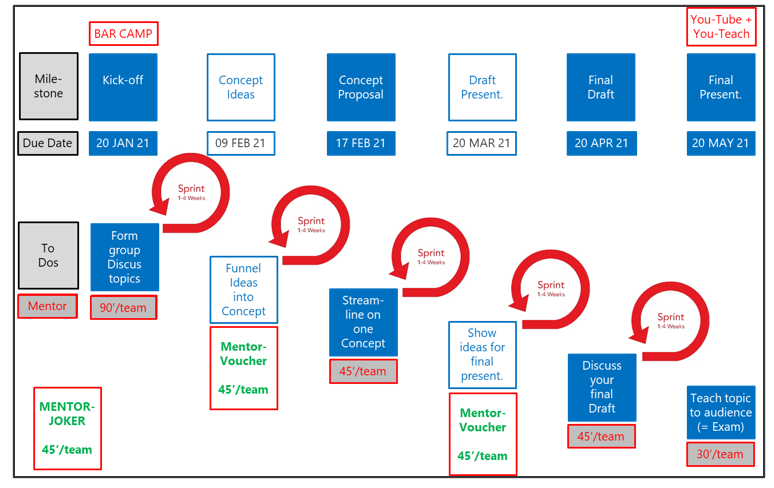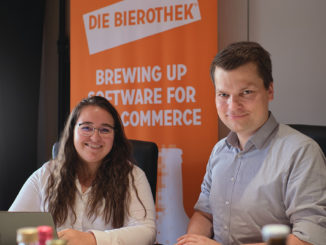
As part of the optimization of the curriculum last year, Munich Business School also introduced a number of innovations in relation to the electives in the Bachelor International Business program. In the spring term 2021, MBS bachelor’s students have been able to select three electives rather two for the first time. To facilitate this, all subjects were divided into three pools, with students choosing one from each. The management electives (pool 1) and industry electives (pool 2) allow students to gain expert knowledge in a specialist subject area and a selected industrial sector. As a result, our students not only explore their personal interests and focuses in greater detail but also further enhance their employability – which was already excellent, given that the majority of MBS students receive a job offer before they graduate. The third pool, the so-called sprint electives, gets our students fit and ready for the agile and volatile working world of the future – no matter which of the four topic areas they choose.
In the sprint electives, students work on a specific topic in the spirit of Scrum’s agile sprint methodology. At the beginning of the course, there is a Barcamp at which students decide between the various topics on offer and form their own teams – all online, of course. However, if you think that choosing a predefined topic would be half the battle, you are a long way wide of the mark. The topics – or rather groups of topics – are very vague and broadly defined. For example, in the case of the sprint elective on the topic of Social and Organizational Psychology, students were able to choose between topics including Motivation, Fairness, Stereotypes and Conflict. What the individual groups develop from these topics remains open, variable and, therefore, agile. The only requirements for the final presentation at the end of the course are that the students teach both the theory and the practical application of their topic to the other groups and produce a video of up to three minutes explaining it. Their route to this outcome is also entirely open – and simultaneously constrained, as the Scrum framework dictates that students only have a limited time window per sprint (known as “timeboxing”) and limited opportunities to discuss matters with their mentors.

“Originally, the idea was to offer this new elective entirely online. Due to the coronavirus pandemic, the concept of an online elective had become outdated and lacked the necessary innovation – so we decided to integrate Sprint methodology. Everyone is talking about agility and agile methods are on the rise, even if they are not nearly as easy to implement as they often sound. With this in mind, we want to deliberately introduce agile methods and help our students become familiar with them. This methodological competence is extremely important; the world around us is becoming increasingly complex and we have to learn to handle that. Even industry is only taking its first steps in implementing this in practice. In contrast, our bachelor’s students can become genuine pioneers by learning about the precise application of the concept of agility and experiencing it for themselves today,” says Prof. Dr. Arnd Albrecht, acdemic director of the bachelor’s program, emphasizing the importance of the new sprint electives.
The agile project process in the MBS sprint elective prescribes two fixed milestones at which the team can discuss their (draft) concept with their mentors. Whether students seek advice from their professors at intermediate milestones is up to them. The students have two communication vouchers and one joker available to them but need to be careful how they play them: although they can play their joker at any time, the vouchers have expiry dates. This means that the course also has an element of gamification – that is, the application of common game elements in a foreign context. If the students fail to play their cards in time, they will have missed their chance. Including the final presentation, students have a total of six opportunities to contact their mentors; three of these are fixed, while the rest remain variable. Indeed, variability is a key word on this new course. According to Dr. Ellen Schmid, a professor at MBS and an expert on agile learning formats, it is not only the students but also the teaching staff who will experience this variability, as they must react flexibly to the queries posed by the groups.
Stefan Baldi, Dean of Munich Business School, also welcomes the new course design: “The electives on the bachelor’s program in International Business have always been a wonderful opportunity for students to define individual focuses and refine their personal profile. The fact that the new sprint electives will allow our students not only to develop specialist knowledge but also to learn a future-oriented methodology is wholly in keeping with our aspiration to provide practical and up-to-date teaching. I’m pleased that the MBS professors are prepared to break the mold and integrate experimental learning in their course portfolio.”



